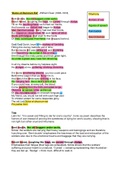‘Dulce et Decorum Est’ -Wilfred Owen (1893-1918) Title/irony
Bent double, like old beggars under sacks, Horrors of war
Knock-kneed, coughing like hags, we cursed through sludge,
Till on the haunting flares we turned our backs, Figures of speech
And towards our distant rest began to trudge.
Men marched asleep. Many had lost their boots, Punctuation
But limped on, blood-shod. All went lame; all blind;
Drunk with fatigue; deaf even to the hoots Sound devices
Of tired, outstripped Five-Nines that dropped behind.
Gas! Gas! Quick, boys!—An ecstasy of fumbling
Fitting the clumsy helmets just in time;
But someone still was yelling out and stumbling
And flound’ring like a man in fire or lime…
Dim through the misty panes and thick green light,
As under a green sea, I saw him drowning.
In all my dreams before my helpless sight,
He plunges at me, guttering, choking, drowning.
If in some smothering dreams, you too could pace
Behind the wagon that we flung him in,
And watch the white eyes writhing in his face,
His hanging face, like a devil’s sick of sin;
If you could hear, at every jolt, the blood
Come gargling from the froth-corrupted lungs,
Obscene as cancer, bitter as the cud
Of vile, incurable sores on innocent tongues,—
My friend, you would not tell with such high zest
To children ardent for some desperate glory,
The old Lie: Dulce et decorum est
Pro patria mori.
Title
Latin for: “it is sweet and fitting to die for one’s country”. Ironic as poem describes the
horrors of war instead of proving the sweetness of dying for one’s country, showing that is
not right but rather cruel and inhumane.
Bent double, like old beggars under sacks,
Simile: the soldiers are carrying their heavy weapons and belongings and are therefore
hunching over. ‘Bent double’ emphasises the heaviness of the load and exhaustion of the
soldiers also due to the emotional trauma and baggage that they are carrying.
Knock-kneed, coughing like hags, we cursed through sludge,
Emphasises their fatigue (their legs are exhausted). Simile shows that the soldiers’
suffering and poor health is unnatural. ’Cursed’ = swearing representing their frustration-
they are fed up. ‘Sludge’ = thick mud- difficult to walk in.
, Till on the haunting flares we turned our backs,
The soldiers are turning around after the nightmarish horrors of the day’s battle.
And towards our distant rest began to trudge.
Literal: They are heading back to the barracks to sleep. Figurative: Allusion to death (the
only time when they will rest). ‘Trudge’ = walk slowly and heavily with great effort.
Men marched asleep. Many had lost their boots,
Repetition of ‘m’ emphasises the monotony (tedious routine) of battle. The soldiers are
zombie-like/robotic/like dead men walking.
But limped on, blood-shod. All went lame; all blind;
The soldiers are exhausted and painfully injured. Their muddiness and bloodiness shows
the horrors of trench warfare. ‘Lame’ = weak- they are in so much pain that they are
unable to walk properly. ‘Blind’ = figurative- they are dizzy and disoriented.
Drunk with fatigue; deaf even to the hoots
Soldiers are confused from the exhausting pain. ‘Deaf’- they cannot even listen to normal
sounds anymore due to the pain. They have lost all senses (desensitised and vulnerable).
Of tired, outstripped Five-Nines that dropped behind.
They cannot even hear the loud bullets behind them. Hard ‘d’ and ‘l’ sounds repeated in
stanza to represent the harsh battlefield conditions. Bullet shells are being personified as
tired from overuse.
Stanza
Owen describes how the soldiers are disabled by the trauma of battle: exhausted and
psychologically traumatised. They are in a horrific environment. The choppy rhythm
mimics the marching of the soldiers.
Gas! Gas! Quick, boys!—An ecstasy of fumbling
Frenzy of overwhelming fear. The soldiers are sobered and forced to come back into life
(panic and chaos). ! creates hysteria. — dramatic pause to introduce suspense.
Fitting the clumsy helmets just in time;
Gas masks for protection from chlorine (big, heavy, uncomfortable).
But someone still was yelling out and stumbling
Implies that not everyone managed to get their helmets on in time. As he watches this
soldier, the panic and hysteria heightens. The soldier is losing balance and screaming out
of desperation and pain. Sibilance mimics the hissing sound of the gas seeping in and
engulfing the soldiers.
And flound’ring like a man in fire or lime…
The soldier is staggering clumsily because he cannot breathe and see. ‘ing’ present tense
used to make it seem as it is happening now (Owen can never forget these horrors).
‘Lime’ = chemical that burns through flesh (complete agony).




